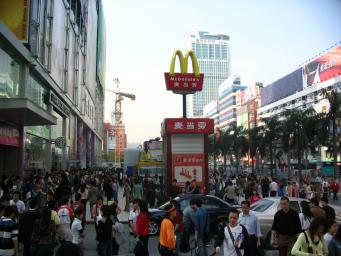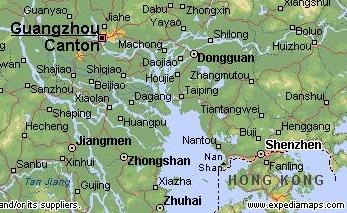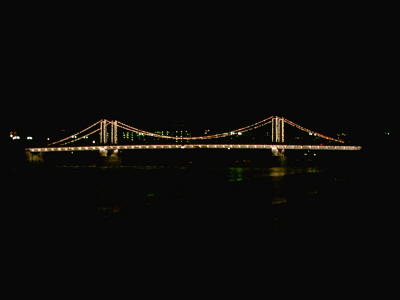We are developing the social individualist meta-context for the future. From the very serious to the extremely frivolous... lets see what is on the mind of the Samizdata people.
Samizdata, derived from Samizdat /n. - a system of clandestine publication of banned literature in the USSR [Russ.,= self-publishing house]
|
The European Union has agreed an “equitable” outcome with China over the vexed issue of whether the Chinese should be allowed to sell textiles to us at those oh-so unfair low prices. It looks like a pretty fudged deal to me, possibly not as draconian as the original quotas demanded by protectionist lobbies in Europe, but still a slap in the face for principled free trade.
While I have my concerns about China – it has a lousy record on human rights for starters – the development of the country’s economy along hopefully free market lines is surely one of the most positive developments of its kind in the world at the moment. Europe’s economy can only benefit in the long run if China becomes prosperous and hence generates a large middle class with a keen appetite for consumer goods and services.
And some of the poorest people in Europe surely stand to gain if they can buy garments for far less than the amount they would otherwise pay. If the case for free trade is to succeed, it is vital that this point is rammed home time and again.
Let Adam Smith have the last word on this from his Wealth of Nations:
Consumption is the sole end and purpose of all production; and the interest of the producer ought to be attended to only so far as it may be necessary for promoting that of the consumer. The maxim is so perfectly self evident that it would be absurd to attempt to prove it. But in the mercantile system the interest of the consumer is almost constantly sacrificed to that of the producer; and it seems to consider production, and not consumption, as the ultimate end and object of all industry and commerce
Boris Johnson, the Tory MP and magazine editor, occasionally bugs me with his latter-day Bertie Wooster routine, which has become a bit of a self-parody, but it is hard not to like a man who writes a wonderfully clear-headed, cant-free article on China like this.
The Member for Henley-on-Thames is unimpressed by the current vogue for getting all upset about matters Chinese, whether it be terrors about Avian flu, dread of ultra-cheap clothes (low-price bras, oh the horrors!) and so forth. Boris is particularly harsh on the European Union’s bout of protectionist folly against cheap Chinese textile exports and the role of that lowlife, EU Commissioner Peter Mandelson:
It is all stark staring nonsense, and founded on the same misapprehension as Peter Mandelson’s demented decision to slap quotas on Chinese textiles, so that the mouths of the Scheldt and the Rhine are apparently silting up with 50 million pairs of cut-price Chinese trousers. It is idiocy, and not just because it is unlike Mandy to come between a British woman and her knickers.
And again:
The emergence of China and its integration into the world economy has been a major spur to growth and a deterrent to inflation. It is an unalloyed good, and it is sad to see our politicians responding with such chicken-hearted paranoia.
UPDATE: I put the wrong article in the link and have changed it. Mea culpa.
Matt Devereux sees reasons to be cheerful in the land of the Rising Sun
Statist hero of the week? On Monday Japanese premier Junichiro Koizumi announced that he would make plans to privatise the national postal service his key election pledge. After losing the privatisation motion to the House of Councillors (upper parliamentary house), Koizumi decided to call a snap election to ask the Japanese public “whether they think the same way.” Early indications show that the strategy might well have paid off, with the Prime Minister’s approval rating rising 9 points thus far on the back of this single issue. In practical terms, the privatisation process will be long and hard.
Japan Post is far more than just a stamp and mail operation. Its $2.9 trillion held in savings and insurance effectively make it the world’s richest bank. With approximately 8,000 more post office outlets than in the UK, the prospect of opening the Japanese state monopoly to market forces make our plans to privatise Royal Mail pale in comparison. It’s not the statistics that impress, however. It’s the extent to which Koizumi has dared to stake his future on a subject recently lacking in North Atlantic political relations.
Take the 2005 Conservative Manifesto – the word “privatise” does not appear once. This despite Michael Howard’s half-baked promise to allow private treatment at NHS prices (and standards) for those willing to pay. It’s as if ideas of free trade and free enterprise have abandoned mainstream UK politics altogether. It’s been left to us crazies on the sidelines to remind the public that high taxation/high spend is not necessarily the only policy.
President Bush fares a little better, though even in the US the semantic goal posts have changed. Pre-election, Bush actively used the term “privatisation” in relation to his proposed shake up of Social Security. It was, he said, a “top priority”. Then, when the election campaign took full swing, privatisation became “reform”. The top priority of Social Security became no priority in Bush’s victory speech. Iraq was everything. Democrats picked up the “p” word as a term of disgust for the administration’s strategy and continue to run with it. The most recently published Rose Garden press conference transcript proves the extent to which Bush is careful not to mention the “private” in relation to the “social”.
What is it that has forced this anti-privatising doublespeak onto the Western political right? Perhaps if our leaders were more eloquent in their defence of the things we hold dear we’d vote for them again. By making a free trade issue central to his election campaign Koizumi is asking for a mandate to dismantle a state monopoly. In this at least the Japanese PM deserves our respect. Now, Mr. Koizumi, about Kyoto…
Piracy in the Straits of Malacca has been a serious problem for many years now and shipping companies have grown tired of waiting for governments in the region to do something effective to stamp it out.
So they are hiring private companies to do it instead. Sounds like an exciting line of work.
It seems just a tad perverse that whilst uttering rhetoric about supporting freedom and democracy, the US is sending its military to help train Communists in Vietnam.
Why, exactly?
What did you do to help the victims and survivors of the Asian Tsunami? Did you help to raise money. Did you don your jogging bottoms and wheeze your way through a sponsored run? Did you sit in bathtub full of maggots for twenty-fours hours? Did you gladly humiliate yourself by joining in with a charity sing-a-thon? Did you run around like headless chicken collecting cuddly toys, blankets and unwanted packs of paracetamol?
Or maybe you just plunged your hand generously into your own pocket, scooped out a chunk of change and handed it over with the (understandably) sincere intentions of doing just a little to help ease the plight of the unfortunate victims of that catastrophe.
If you did any of those things, well, you have certainly provided relief to some quarters:
Oxfam has had to pay £550,000 in customs duty to the Sri Lankan government for importing 25 four-wheel-drive vehicles to help victims of the tsunami, The Daily Telegraph has learned.
The sum was levied by customs in Colombo which have refused to grant tax exemptions to non-governmental organisations working to repair damage caused by the giant Boxing Day wave.
The Indian-made Mahindra vehicles, essential to negotiate damaged roads and rough tracks, remained stuck in port at Colombo for almost a month as officials completed the small mountain of paperwork required to release them. Customs charged £2,750 “demurrage” for every day they stood idle.
So there we have it, good people. Kindly Westerners care more about the sodden, bedraggled, impoverished masses of Sri Lanka than their own government which has made a priority of cutting off its own pound (or several hundred thousands of pounds) of flesh first. And this is only the stuff that is being reported. Try to imagine, if you can, the graft and pilfering that is going on underneath the radar.
As for Oxfam, I can spare no words of comfort. Their incessant mewling about ‘fair trade’ means putting even more power and looted wealth into the hands of the kind of third-world government spivs who have just royally shafted them. I doubt very much if they will learn anything useful from this object lesson. These people seldom do.
If I had suggested, in the days following the disaster, that all those munificent donations were going to be stolen then the comments section of this blog would have experienced a mini-tsunami of its own as a wave of furious readers flooded in to inform me that I had “reached new lows”. Too cynical? There is no such thing as ‘too cynical’. Allow me to put the record straight: every penny of that relief fund is eventually going to worm its way into the pockets of state officials and professional Western poverty-mongers.
The Emperor was always naked but now he’s running around flashing his genitals as well.
I realise that to do business in China means having to deal with the realities of the Chinese state, but when Microsoft becomes yet another direct collaborator with Chinese repression by adjusting its blog tools to help block online speech using words such as “democracy,” “freedom,” or “human rights,” then clearly Microsoft has become a party to the trampling of human rights in China and is not just a bystander.
Next time you hear of all the philanthropic work done by MS and Bill Gates, just keep in mind that there is a very nasty flip side to the Giant from Redmond. It would appear that even Gates has a price at which his principles are clearly ‘negotiable’.
Update:: There is some question of whether or not this is actually true according to a commenter who has set up a Chinese MSN Space blog. I will try to contact Voice of America and see what they have to say.
Chen Yonglin, a Chinese diplomat with inside knowledge of his country’s large scale espionage activities within Australia, has revealed that the Chinese intelligence services sometimes ‘forcibly repatriate’ (i.e. kidnap) political enemies in Australia and bring them back to China. He has also just tried to defect in order to tell his story and has, with indecent haste, been refused political asylum within only 24 hours of asking for it.
Why? Because too many members of the Australian ruling class are in the pockets of Chinese business interests and allowing Chen Yonglin to defect could cause the Chinese government to threaten lucrative trade deals with Australian companies.
Our Australian Samizdatistas have often told me just how cynical and corrupt the people at the top of Australian politics are but I still find this deeply disturbing. These are shameful days down-under and I hope a lot of Australians are angry as hell.


Much has been said and written (some of it by me) on the growth of the Chinese economy and the rise of China as an economic power, and of the growth of an immense manufacturing region on the sides (particularly the east side) of the estuary of the Pearl River between Hong Kong and Guangzhou (Canton). If there is a workshop of the world today the way there was in the north of England in the mid 19th century, then this is it. I have for a while wanted to go and look at it, but I have usually lacked either the time or the money. Ideally I would like to start in Hong Kong, work my way upstream through Shenzhen and Dongguan to Guangzhou, and then back down the other side of the estuary via Zhongshan and Zhuhai to Macau, on the opposite side of the estuary to Hong Kong.

But alas I have still not been able to do this. However, in March I arranged a trip to Australia to visit my family. And I was able to manage a stopover in Hong Kong for three days. Although I was not going to be able to do the trip up and down the estuary that I had hoped to do, I was at least able to spend one day doing something a little interesting, which was to cross the border from Hong Kong to Shenzhen in China proper.
Well, sort of in China proper.Shenzhen is a “Special Economic Zone”. China gave Shenzhen this status in 1980 . (The status was subsequently given to Zhuhai across the border from Macau, the port of Shantou north of Hong Kong, Xiamen in Fujian provice across the water from Taiwan, and the southern island province of Hainan). These areas were given more economic freedom that the rest of China, and more importantly were open to investment from and trade with the rest of the world. This was convenient with the people of Hong Kong, as at that time Hong Kong was undergoing the transition from poor to rich, and labour in Hong Kong was becoming too expensive for the traditional textiles and other low cost manufacturing base to survive in Hong Kong. What happened was that the manufacturing moved across the border to Shenzhen, a boom ensued, and people (to the extent that they were allowed to) flocked to Shenzhen from other regions of China. Since then, much the same thing has happened to Shenzhen as happened to Hong Kong,although Shenzhen remains a less sophisticated place.

A lot of trading and lower level services, including that with slightly more questionable business practices, has moved to Shenzhen. Labour has become too expensive in Shenzhen for a lot of the low cost manufacturing to take place there, so it has moved further upriver, particularly to Dongguan. (Capacity constraints are much more stretched on the east bank than the west, which is the impetus for a proposal for a huge bridge connecting Lantau island in Hong Kong with Macau and Zhuhai on the other side of the estuary, construction of which is scheduled to commence later this year).
In any event, on Sunday morning I got the train from Kowloon to Lo Wu and (after a few hassles with getting a visa at the border) crossed over into Shenzhen.

I guess this makes David Carr happy
Initially it felt like sleazy border towns everywhere, but it ultimately turned out to be far more interesting that that. → Continue reading: A belated report on a trip to the wild East.
Glenn Reynolds links to this article saying that the French government has put its support behind a law allowing the Chinese military to attack Taiwan as well as end the EU embargo of arms to China.
So let me get this straight. France, a democracy (sort of) decides to let a communist dictatorship – China – acquire the necessary means and legal clearance to attack a democratic neighbour that has posed no threat or problem whatsoever to France (apart from cheap electronics, maybe).
I guess that is what is known as nuanced foreign policy. Way to go, Jacques!
Over the past month or so there have been repeated anti-Japanese demonstrations and riots in China. That in itself is unusual as the Chinese authorities are not keen to allow demonstrations to become a habit, but are signs that this series of demonstrations have the support of the Chinese government.
One of the great things about the blogosphere is that if something noteworthy happens somewhere, there is bound to be a blogger to write about it. Andres Gentry is in Shanghai and popped on down to the Japanese Consulate to have a look – his report has photos and is well worth a read.
But what I found eye-opening was the attitudes of the locals.
Most of the protesters were young 20-somethings and though there were more males than females there were still a fair number of women involved. On not a few occasions it seemed the demonstration was an opportunity for a date as I watched couples walk past. A few parents brought their infant children.
We stayed at the main intersection near the Japanese Consulate General for about half an hour, enough time for one fellow standing next to us to tell us his opinions on Japan. He said he had done his BA work in Nanjing and was doing research at a nearby financial school. He made the obligatory reference to how much he hated Japan and the Japanese. The UN Security Council seat didn’t come up for him. I asked him what the goal of the protesters was and he gave me two: 1) to let Japan know how much Chinese hate Japan and 2) to show Beijing how much Chinese hate Japan. I wasn’t surprised at reason number 2. I asked him why he didn’t just choose a new government for China if he was dissatisfied with the current one and he emphatically said that would be a bad idea becaue the last time that China experienced that kind of freedom it had broken up into smaller states. He did not seem keen on the idea of democracy. I asked if he thought foreigners would start leaving China for other countries, especially India, in light of the protests and he seemed very confident that this wouldn’t happen. He explained he had done research on the Indian economy and that its efforts to modernize had so far failed. He also seemed quite keen to tell me that Indians are fundamentally lazy and that Chinese are fundamentally hard workers so foreign companies have little incentive to leave China.
This wasn’t a conversation, I was only asking questions since I had no intention whatsoever to tell people my own opinions. I confess I repeatedly pressed the student on his attitude towards democracy and the strangeness that he was allowed to protest Japan but not allowed to protest anything about China, much less choose his own leaders. He was adamant that freedom would not be good for China at this time. We spoke almost entirely in English, something which was his choice and one I thought was reasonable since if we spoke in Chinese and everyone around us knew what he was saying than perhaps he might get into trouble. I tried on a number of occasions to ask his girlfriend some questions but she refused to answer and was self-evidently uncomfortable with her boyfriend’s loqaciousness.
Anyway, read the whole thing, which includes a diversion to a local Hooter’s restuarant and links to other accounts.
As has been mentioned, I am presently in southern China. At this precise moment, I am using WiFi in a Starbucks in central Shenzhen, just over the border from Hong Kong, recuperating from the heat and humidity outside, and taking an immense dose of caffeine to fight my jetlag.
The Pearl River delta is at this point in history the workshop of the world, particularly in terms of electronics manufacturing (although the goods with the high capital costs tend to still be made in Taiwan, Korea, and elsewhere). Much of the manufacturing tends these days to be done in places like Dongguang (a little further upstream) but Shenzhen is where you go if you want to buy the stuff.
I shall have a lot more to say on this (and lots and lots of photos) later. But for now, here is a picture of some graphics cards with really big fans that I took in a truly immense electronics market a few minutes ago.

This will no doubt make Perry happy.
|
Who Are We? The Samizdata people are a bunch of sinister and heavily armed globalist illuminati who seek to infect the entire world with the values of personal liberty and several property. Amongst our many crimes is a sense of humour and the intermittent use of British spelling.
We are also a varied group made up of social individualists, classical liberals, whigs, libertarians, extropians, futurists, ‘Porcupines’, Karl Popper fetishists, recovering neo-conservatives, crazed Ayn Rand worshipers, over-caffeinated Virginia Postrel devotees, witty Frédéric Bastiat wannabes, cypherpunks, minarchists, kritarchists and wild-eyed anarcho-capitalists from Britain, North America, Australia and Europe.
|




